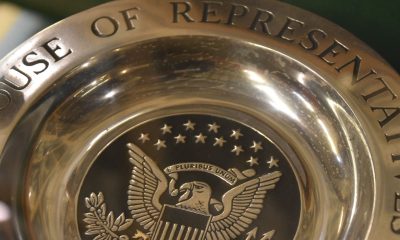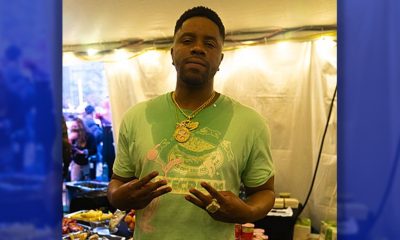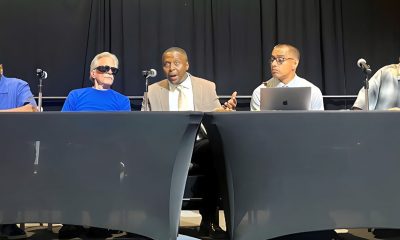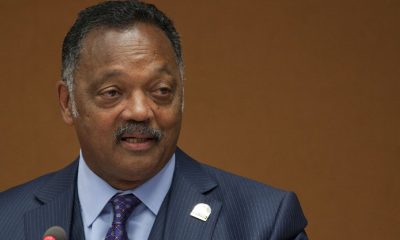Community
She Educates People in a Man’s World
THE TENNESSEE TRIBUNE — Latiaa Sneed seems uniquely qualified for one of her assignments at Fire Hall No. 1. Sneed majored in theater with a minor in psychology at Middle Tennessee State University and so she likes her role as a Dalmatian dedicated to fire safety.
By Clint Confehr
COLUMBIA, TN — Latiaa Sneed seems uniquely qualified for one of her assignments at Fire Hall No. 1.
Sneed majored in theater with a minor in psychology at Middle Tennessee State University and so she likes her role as a Dalmatian dedicated to fire safety.
Technically, she wears a costume manufactured for a safety promotions company that portrays the “Fire Pup” in coloring books. However, most children see the costumed crusader as “Marshall” the fire dog on “Paw Patrol,” a children’s cartoon show that’s not standard fare for adults, unless they’re parents, baby sitters, or close relatives.
Firefighter Sneed, an advanced emergency medical technician who started her EMT training at Columbia State Community College, was recruited by Columbia Fire and Rescue Chief Ty Cobb when he was assistant chief. Cobb is a former Democratic member of the Tennessee House of Representatives.
“I started about a year ago,” Sneed said. As for her special assignment that includes wearing the large costume, she grins; “They make the rookie do it.”
The costume head is heavy. It’s hot all the way down to its oversized red fire boots.
Asked if it’s “a dog’s life” being a rookie, she replied, “Well, I’m over the public education program, so … a lot of the times, I’m ‘Marshall’ (also known as Fire Pup) or I go and talk to the kids, but I like it, so it’s OK.”
She teaches fire safety lessons to fire hall visitors. That includes explanations about electrical fires, responsibilities for babysitters, and calling 911. Her chief wants her to emphasize how to escape from a burning building.
Originally from Murfreesboro, Sneed reflects on her MTSU minor in psychology; perhaps that should have been with a focus on child psychology and not just because she portrays Fire Pup. She has a son.
Sneed is also certified in swift water rescue with training at the Tennessee Fire Service and Codes Enforcement Academy in Bedford County. It was challenging. She’s overcome a fear of water.
Her story is of a woman succeeding in a man’s world.
Cobb, with Sneed portraying Fire Pup, visit elementary schools, day care centers, appear at festivals, church- and civic club programs and other events where they distribute coloring books, light-weight, red-plastic fire helmets for children and other goodwill tchotchke-like souvenirs.
“Please be safe,” is Sneed’s request to her audience. “Honestly, that’s the biggest thing.”
She wants to educate all age-groups.
“If you have any questions” about fire safety,” she says, “go to your local fire department.
“Make sure you don’t start something in the kitchen and leave the kitchen. Once you start cooking, be sure to finish.”
Last month, Sneed portrayed Fire Pup (recognized as Marshall by children) at a four-year-old boy’s birthday party in Fire Hall No. 1. After Fire Pup left the children to enjoy their Firehouse sandwiches, pizza and Dairy Queen birthday cake, Sneed led a tour of a big red fire engine in the garage, complete with an opportunity to climb across crew cab seating.
The garage was largely empty. Firefighters remained ready to respond to calls announced on a loud speaker from a dispatcher’s microphone.
“The kids had a good time,” Fire Capt. Josh Carter said. “It’s not an imposition on the firefighters,” but it was a special thing.
Columbia fire-rescue “wants to be involved in the community,” Cobb said March 13 after visiting Columbia Central High School with Fire Pup for a special needs students’ basketball game. The birthday party was an event sold during a silent auction during a formal affair in a restored mansion; last year’s venue for the annual James K. Polk Ball which raises operating funds for the only surviving residence of the 11th President of the United States.
Capt. Carter says if parents bring a son and/or daughter to the hall for a visit, they’re welcome, but Fire Pup might not make an appearance because normally firefighters “don’t do birthday parties” in the fire hall, Carter says, citing liability issues.
Fire Pup, Chief Cobb says, “is just one thing we do to be involved in the community and teach safety.”
This article originally appeared in The Tennessee Tribune.
Activism
Oakland Post: Week of April 17 – 23, 2024
The printed Weekly Edition of the Oakland Post: Week of April 17 – 23, 2024

To enlarge your view of this issue, use the slider, magnifying glass icon or full page icon in the lower right corner of the browser window. ![]()
Activism
Oakland Schools Honor Fred Korematsu Day of Civil Liberties
Every Jan. 30, OUSD commemorates the legacy of Fred Korematsu, an Oakland native, a Castlemont High School graduate, and a national symbol of resistance, resilience, and justice. His defiant stand against racial injustice and his unwavering commitment to civil rights continue to inspire the local community and the nation. Tuesday was “Fred Korematsu Day of Civil Liberties and the Constitution” in the state of California and a growing number of states across the country.

By Post Staff
Every Jan. 30, OUSD commemorates the legacy of Fred Korematsu, an Oakland native, a Castlemont High School graduate, and a national symbol of resistance, resilience, and justice.
His defiant stand against racial injustice and his unwavering commitment to civil rights continue to inspire the local community and the nation. Tuesday was “Fred Korematsu Day of Civil Liberties and the Constitution” in the state of California and a growing number of states across the country.
One OUSD school is named in his honor: Fred T. Korematsu Discovery Academy (KDA) elementary in East Oakland.
Several years ago, founding KDA Principal Charles Wilson, in a video interview with anti-hate organization “Not In Our Town,” said, “We chose the name Fred Korematsu because we really felt like the attributes that he showed in his work are things that the children need to learn … that common people can stand up and make differences in a large number of people’s lives.”
Fred Korematsu was born in Oakland on Jan. 30, 1919. His parents ran a floral nursery business, and his upbringing in Oakland shaped his worldview. His belief in the importance of standing up for your rights and the rights of others, regardless of race or background, was the foundation for his activism against racial prejudice and for the rights of Japanese Americans during World War II.
At the start of the war, Korematsu was turned away from enlisting in the National Guard and the Coast Guard because of his race. He trained as a welder, working at the docks in Oakland, but was fired after the bombing of Pearl Harbor in 1941. Fear and prejudice led to federal Executive Order 9066, which forced more than 120,000 Japanese Americans out of their homes and neighborhoods and into remote internment camps.
The 23-year-old Korematsu resisted the order. He underwent cosmetic surgery and assumed a false identity, choosing freedom over unjust imprisonment. His later arrest and conviction sparked a legal battle that would challenge the foundation of civil liberties in America.
Korematsu’s fight culminated in the Supreme Court’s initial ruling against him in 1944. He spent years in a Utah internment camp with his family, followed by time living in Salt Lake City where he was dogged by racism.
In 1976, President Gerald Ford overturned Executive Order 9066. Seven years later, the 9th Circuit Court of Appeals in San Francisco vacated Korematsu’s conviction. He said in court, “I would like to see the government admit that they were wrong and do something about it so this will never happen again to any American citizen of any race, creed, or color.”
Korematsu’s dedication and determination established him as a national icon of civil rights and social justice. He advocated for justice with Rosa Parks. In 1998, President Bill Clinton gave him the Presidential Medal of Freedom saying, “In the long history of our country’s constant search for justice, some names of ordinary citizens stand for millions of souls … To that distinguished list, today we add the name of Fred Korematsu.”
After Sept. 11, 2001, Korematsu spoke out against hatred and discrimination, saying what happened to Japanese Americans should not happen to people of Middle Eastern descent.
Korematsu’s roots in Oakland and his education in OUSD are a source of great pride for the city, according to the school district. His most famous quote, which is on the Korematsu elementary school mural, is as relevant now as ever, “If you have the feeling that something is wrong, don’t be afraid to speak up.”
Community
For Cervical Cancer Month, Medical Community Focused on Education
January was Cervical Cancer Awareness Month. Physicians, advocates and others in the medical community commemorated the month by raising awareness about a form of cancer they say is highly preventable and treatable. Cervical cancer is caused by a virus called the human papillomavirus (HPV) and it develops slowly over time but can be prevented with proper care in girls as young as 13 years old.

By Magaly Muñoz
January was Cervical Cancer Awareness Month.
Physicians, advocates and others in the medical community commemorated the month by raising awareness about a form of cancer they say is highly preventable and treatable.
Cervical cancer is caused by a virus called the human papillomavirus (HPV) and it develops slowly over time but can be prevented with proper care in girls as young as 13 years old.
Sonia Ordonez, an OBGYN and gynecology surgeon at Kaiser Permanente, stated that as soon as people with cervixes reach the maturity reproductive age, they should start taking preventative measures like getting the HPV vaccine. The vaccine involves a series of two-doses for people aged 9 through 14 or three-doses for people 15 through 45 years old.
“I see a lot of young women who can’t remember or may not have gotten [the vaccine] when they were younger, or maybe got one, but we can give them the series of vaccines and restart at any point in time,” Ordonez said.
She said that cervical cancer is not the only cancer caused by HPV. Strains of the virus can also lead to throat, anal and penile cancers.
Screening is also an effective way to check for cervical cancer and should be done every three years after someone turns 21, doctors recommend. It is best to start as early as possible to catch occurrences early.
Ordonez said that this cancer is also more likely found in people of color and has led to more deaths overall.
A Mayo Clinic article published last month stated that Black women are more likely to be diagnosed and die of cervical cancer, compared to White women in the U.S.
2,000 Black women are diagnosed every year with cervical cancer and 40% die as a result.
“This disparity is not due to genetic differences among White, Black or Hispanic women, but rather related to systemic racism, access to healthcare and socioeconomic factors,” Dr. Olivia Cardenas-Trowers, a Mayo Clinic urogynecologist, said in the article.
Ordonez stated that immigrant women are also highly susceptible to the cancer, as many Latin American countries may not have accessibility to screenings or lack of insurance makes it harder for them to get tested.
Hispanic women are 40% more likely to be diagnosed with cervical cancer, and 30% more likely to die from it, as compared to non-Hispanic White women, according to the Office of Minority Health.
Family medicine physician, Joy Anyanwu, stated that the pandemic contributed to hesitancy about getting cervical cancer screenings among some women. Other factors are people’s aversion to vaccines, parents not wanting to believe that their children are or will become sexually active, and doubt about the overall effectiveness of the vaccine.
“The vaccine is very safe — over 97% effective in preventing cervical cancer,” Anyanwu said. “Even if you aren’t having sex, the earlier you start would actually help.”
Anyanwu said she understands that parents might not want to ask questions about their children’s reproductive health, but it’s a mindset that can be a barrier to having important conversation about prevention or care.
To keep families their families and communties healthy, the doctor emphasized that people should prioritize keeping up with their vaccine series and going to screenings every year.
-

 Activism4 weeks ago
Activism4 weeks agoOakland Post: Week of March 20 – 26, 2024
-

 #NNPA BlackPress3 weeks ago
#NNPA BlackPress3 weeks agoCOMMENTARY: D.C. Crime Bill Fails to Address Root Causes of Violence and Incarceration
-

 #NNPA BlackPress3 weeks ago
#NNPA BlackPress3 weeks agoMayor, City Council President React to May 31 Closing of Birmingham-Southern College
-

 #NNPA BlackPress4 weeks ago
#NNPA BlackPress4 weeks agoCOMMENTARY: Lady Day and The Lights!
-

 #NNPA BlackPress3 weeks ago
#NNPA BlackPress3 weeks agoFrom Raids to Revelations: The Dark Turn in Sean ‘Diddy’ Combs’ Saga
-

 Activism3 weeks ago
Activism3 weeks agoOakland Post: Week of March 27 – April 2, 2024
-

 #NNPA BlackPress4 weeks ago
#NNPA BlackPress4 weeks agoBaltimore Key Bridge Catastrophe: A City’s Heartbreak and a Nation’s Alarm
-

 #NNPA BlackPress3 weeks ago
#NNPA BlackPress3 weeks agoBaltimore’s Key Bridge Struck by Ship, Collapses into Water




















































